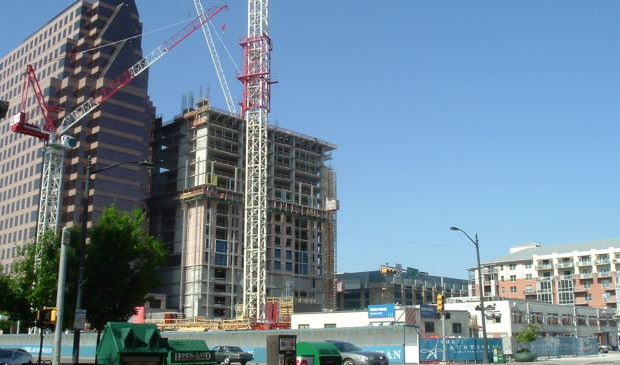UT study, proposed task force would tackle residential displacement
Friday, July 21, 2017 by
Chad Swiatecki With the issue of residents being priced out of their longtime neighborhoods becoming a topic of discussion in most city initiatives, Mayor Steve Adler said the time has come to tackle the issue directly. That was what prompted Adler to announce earlier this month his hope to form a task force on displacement and gentrification after City Council returns from its July recess.
Adler told the Austin Monitor that displacement has been a component of discussions on CodeNEXT density increases, the work of the city’s Strategic Housing Blueprint and panels held for the Mayor’s Task Force on Institutional Racism and Systemic Inequities.
“Rather than address it as a part of multiple different places and conversations I thought it made sense to look at it comprehensively,” he said. “Let’s figure out the things to do and look at what’s hurting us, because I’m going to do as many things as I can on this.”
Adler said if Council passes a resolution creating the task force he’ll work with Council members who have taken an interest in the displacement issue – naming Delia Garza, Pio Renteria and Leslie Pool specifically – to pull together educators, community members and other stakeholders to serve. Adler said a combination of density bonuses with affordable housing requirements, improving the middle-class job economy and creating a “strike fund” to preserve middle-class housing are some of the policy tools the city has available to address displacement.
“This is not a problem that’s unique to Austin, and it’s especially present in cities that are thought of as doing the best,” he said. “Lots of people are trying to find answers and even though there are some (policy tools) that the legislature prohibits us from having, there’s still lots available to us.”
Part of the effort will include determining what areas of the city are most prone to the forces causing displacement, and examining how residents and neighborhoods are affected by fast-rising rents and property values.
In a post on Council’s online forum following up on Adler’s announcement, Pool discussed her work with Elizabeth Mueller, an associate professor at the University of Texas in community and regional planning, to launch a study on gentrification and displacement.
“The goal is to dig deeply into what we already know is occurring to get objective data analysis on who is affected, where it’s happening and the causes,” she wrote. “Ultimately, this thorough research will provide a foundation for good policy decisions to help stabilize our vulnerable communities.”
Mueller said the study will result in a series of maps based on changes in census tracts from 2000 to 2012 and 2016, taking into account changes in housing costs and the economic inability of residents to keep up with the rising costs. The study will also offer policy recommendations for the city that can be discussed and possibly supported by the task force.
In an interview via email with the Monitor, Mueller said a combination of macroeconomic forces and previous mishandled policy has brought Austin to the point where swaths of longtime residents are having to move away from the city.
“There are large scale forces – income inequality, rapid population growth in our region, the financialization of housing (meaning that housing has become a focus of global investors, valued as an investment vehicle in ways that undermine its use for housing, incentives for maintenance, etc.),” she wrote.
“There are also forces that are not historically rooted and specific to our context – all the ways that we shaped which parts of town were stable, protected residential areas, and which were not come into play now. Areas that were not protected (the 1928 ‘negro district’ being the prime example – but also commercial corridors that include housing) that are centrally located or that are proximate to transit are now considered valuable and desirable sites for redevelopment. Those areas are most vulnerable to change and also places where people with lower incomes have lived – precisely because these places were defined as undesirable (relative to other parts of town.)”
Photo by Tim Patterson made available through a Creative Commons license.
The Austin Monitor’s work is made possible by donations from the community. Though our reporting covers donors from time to time, we are careful to keep business and editorial efforts separate while maintaining transparency. A complete list of donors is available here, and our code of ethics is explained here.
You're a community leader
And we’re honored you look to us for serious, in-depth news. You know a strong community needs local and dedicated watchdog reporting. We’re here for you and that won’t change. Now will you take the powerful next step and support our nonprofit news organization?









